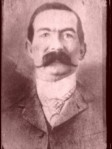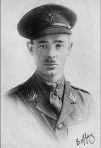The Truth About Traitors
For quite some time, it appears that I've been surrounding myself with treacherous deeds and hardly been aware of it.
Last night, I watched a documentary. It followed the highly successful Irish comedian Brendan O'Carroll, who was the subject of an edition of Who Do You Think You Are?. If you don't already know, the programme is a kind of genealogy detective hunt of a celebrity's ancestors.
I was interested because I happen to like O'Carroll, but also because his grandfather had been murdered by persons unknown during the Irish War of Independence. A note had been pinned to his body claiming he had been shot as a traitor by the IRA.
O'Carroll's hunt revealed that his grandad, Peter O'Carroll, had in fact, been assassinated by a member of British Intelligence because he would not give up his sons, who were active volunteers in the IRA at the time.
O'Carroll had always suspected that the note on his grandad's body was bogus. He had it confirmed in the end, and even had the name and picture of the assassin, a one-legged war hero by the name Jocelyn Lee Hardy.
It was a fascinating, true story - involving murder and alleged traitors, and it had all happened in my old neighbourhood, just around the corner from my family home.
My own interest in treachery is evident in the subject matter of my most recent historical novel, A Time of Traitors, which tells the story of the hunt to unmask a traitor within the IRA during the War of Independence.
Oddly, though, it's only dawned on me in the last few days that I have been preoccupied with treachery and foul deeds for a lot longer than that.
My first published book, Tan, had a character who betrayed his own family in order to better himself, and my second book - The Golden Grave - sees friends fall out and do terrible things for the lure of treasure.
Stories of treachery can make for fascinating reading, but they can be uncomfortable, too. For one thing, they sometimes don't fit the narrative we have grown to associate with certain subjects. Take the example of the Jews who fought for Hitler during the Second World War.
Yes, that really did happen.
It was a quirk of history that had its origins when the Soviet Union invaded Finland in 1939.
Finland had been ruled by Russia until its independence in 1917. Under Russian law, Jews had been conscripted into the army at the age of ten and had been forced to enlist for up to 25 years.
Therefore, it was almost without exception that the Jews of Finland were descended from Russian soldiers who had been posted to the region during their military service.
As a result, Finland's Jews were always viewed with a little suspicion by the rest of the population. So, when Russia invaded Finland in 1939, Jewish citizens took the opportunity to prove their patriotism and joined up to fight the Soviet forces.
Both sides battled each other to an uneasy standstill, until Hitler decided to launch Operation Barbarossa, his invasion of Russia, in 1941. That's when things became a little complicated for Finland's Jewish troops.
Finland and Germany soon agreed a pact in which both fought their common enemy. In fact, there were occasions when Finnish Jews and Germans fought side by side against the Russians.
One Jewish Finn was even awarded one of the Nazi's highest military accolades.
In September 1941, Major Leo Skurnik, a medical officer, organised the evacuation of a field hospital on the Finnish-Russian border, saving the lives of over 600 men in the process, including members of the SS.
He did so showing little regard for his own safety, and in the face of heavy Soviet shelling. For his bravery Skurnik received the Iron Cross from the German High Command.
Many of these Jewish soldiers had relatives in Poland. They were certainly aware of the suppression that was going on there and were aware of Hitler's policies, even if they didn't know about the gas chambers. Had they considered what their fate would be if the Nazis actually won their war against Stalin's forces?
Some Jews would be aghast to know that their own people would serve with the very troops who were responsible for the Holocaust.
As far as Finland's fighting Jews were concerned, though, they were Finns first - engaged in a defensive war against Russia while their ally was fighting an offensive one. For them, it was a case of patriotism above self-preservation.
That is a notion, however, which doesn't sit well with those African-Americans who betrayed their own communities by spying for white segregationists in Mississippi in the Sixties.
Yes, that also happened.
No logic in the world would make one think such a thing was possible. but in fact, as the documentary Spies of Mississippi outlines, several black Americans preferred the certainty of the old white supremacist system to that being promulgated by the youthful arrogance of a new generation.
In one case information provided by an African-American spy led to the infamous murder of three civil rights activists in June, 1964.
The men, Michael Schwerner (24), Andrew Goodman (20), both from New York and James Chaney (22), from Meridian Mississippi, were all members of the Congress of Racial Equality, a group dedicated to non-violent direct action against racial discrimination.
They were part of the 'Freedom Summer' campaign, which was a bid to register African-Americans to vote. The men's bodies were discovered a little over 50 years ago, on August 4, 1964.
It later transpired that the spy in question had passed on their car's license plate to white segregationists, who in turn passed it on to members of the Ku Klux Klan.
Their murders created uproar across America and led to a FBI crackdown in the state that went a great way towards achieving the very goals those three young men had given their lives for.
It is worth remembering, though, that traitors can also bring hope. After all, America's founding father's were viewed as such by their colonial rulers.
Treachery is one of the building blocks of history. It can bring out the very worst in some and the very best in those who fight against it.
Such behaviour is part of the human condition - wreaking havoc and causing heartache as its ripples spread wider. Yet, it is in our DNA and, as galling as it is to say, the world would be a duller place without it.
The Wild Geese Shop
Get your Wild Geese merch here ... shirts, hats, sweatshirts, mugs, and more at The Wild Geese Shop.
Irish Heritage Partnership
Adverts
Extend your reach with The Wild Geese Irish Heritage Partnership.
Top Content
Videos
© 2026 Created by Gerry Regan.
Powered by
![]()
Badges | Report an Issue | Privacy Policy | Terms of Service





You need to be a member of The Wild Geese to add comments!
Join The Wild Geese